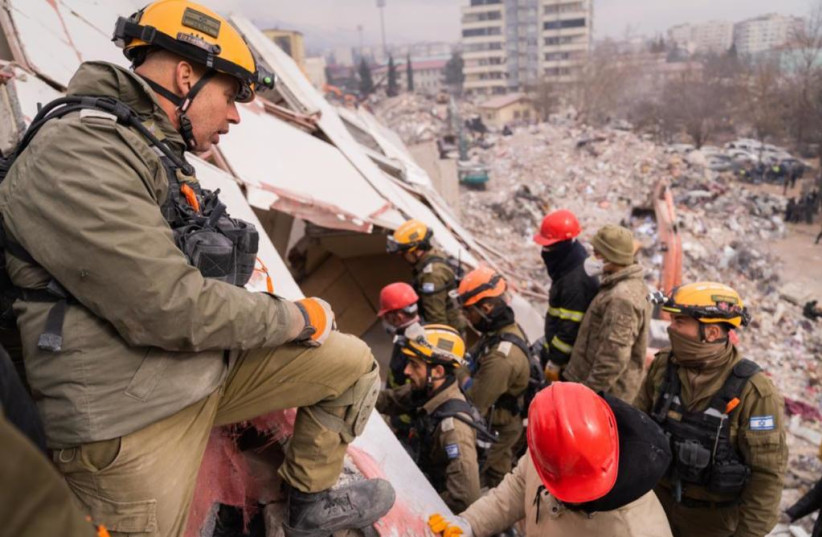This week the Israeli search and rescue team that rushed to aid Turkey in the wake of the devastating February earthquake received an award from Turkish President Recep Tayyip Erdogan. A medal and certificate of appreciation were presented to Col. Golan Vach, the commander of the team from the IDF Home Front Command that went to Turkey in early February. Israel’s deputy ambassador received the letter of appreciation at the event alongside Vach.
Israel’s search and rescue team helped rescue 19 people after the earthquake. Vach also met recently with one of the families rescued by the team.
The mission to help Turkey was organized quickly and professionally in line with Israel’s decades of experience aiding countries around the world after natural disasters.
The team is trained to the highest standards because of the unique challenges Israel’s home front command faces. For decades, Israel has had to deal with rocket fire and other terror attacks, as well as the chances of a larger conventional war, challenges that require having search and rescue units able to respond at a moment’s notice.
The Jewish state has sent more than 15 aid missions abroad after natural disasters and other crises. It has set up field hospitals and sent IDF doctors. Israel has helped provide assistance to thousands of people in these missions and saved hundreds of lives, according to the Foreign Affairs Ministry.

In March 2011, for instance, Israel was one of the first countries to send aid to Japan after an earthquake there. Israel sent 82 tons of aid to Sri Lanka after the 2004 Tsunami and helped in New Orleans after Hurricane Katrina in 2005 Israel also helped in Miami after the Surfside condo collapse in 2021.
Speed is of the utmost importance in the wake of natural disasters or building collapses. It is thus important to get to a country within days to save lives.
During the rescue mission to Turkey, Prime Minister Benjamin Netanyahu commended the team, noting that Israel was “carrying out a humanitarian mission of the highest order, bringing much honor to us and the State of Israel and showing Israel’s true face to the world.”
Israel must focus on efforts at home, as well as abroad
While Israel is a world leader in sending search and rescue teams in times of crises, at home Israel faces obstacles to making sure the country is prepared for a crisis.
According to a recent estimate, some 80,000 buildings more than three stories high lack reinforcement against earthquakes. This means hundreds of thousands of apartments lack the reinforcement to deal with a potential natural disaster.
Key areas, such as Jerusalem and along the Jordan Valley, require more investment to reinforce buildings.
Israel should thus increase efforts to prepare the country for an earthquake or other natural disaster. Now is the time to prepare the country for the years ahead, expediting the reinforcement of those structures that need it and enforcing building codes.
At the same time, it is important that we continue to invest in the IDF Home Front Command and its search and rescue team. Israel’s aid to other countries is an important symbol of how we can fulfill the Jewish imperative to be a light unto the nations and become the moral beacon that the state’s founders, including David Ben-Gurion, considered a state mission. We can also share our experiences with other countries as part of our foreign policy.
Israel’s aid to a country like Turkey can play a key role in reconciliation and coexistence between peoples. Israel has practical experience that can be shared with others and we should continue to highlight this in meetings with foreign delegations and in our own foreign policy and outreach.
